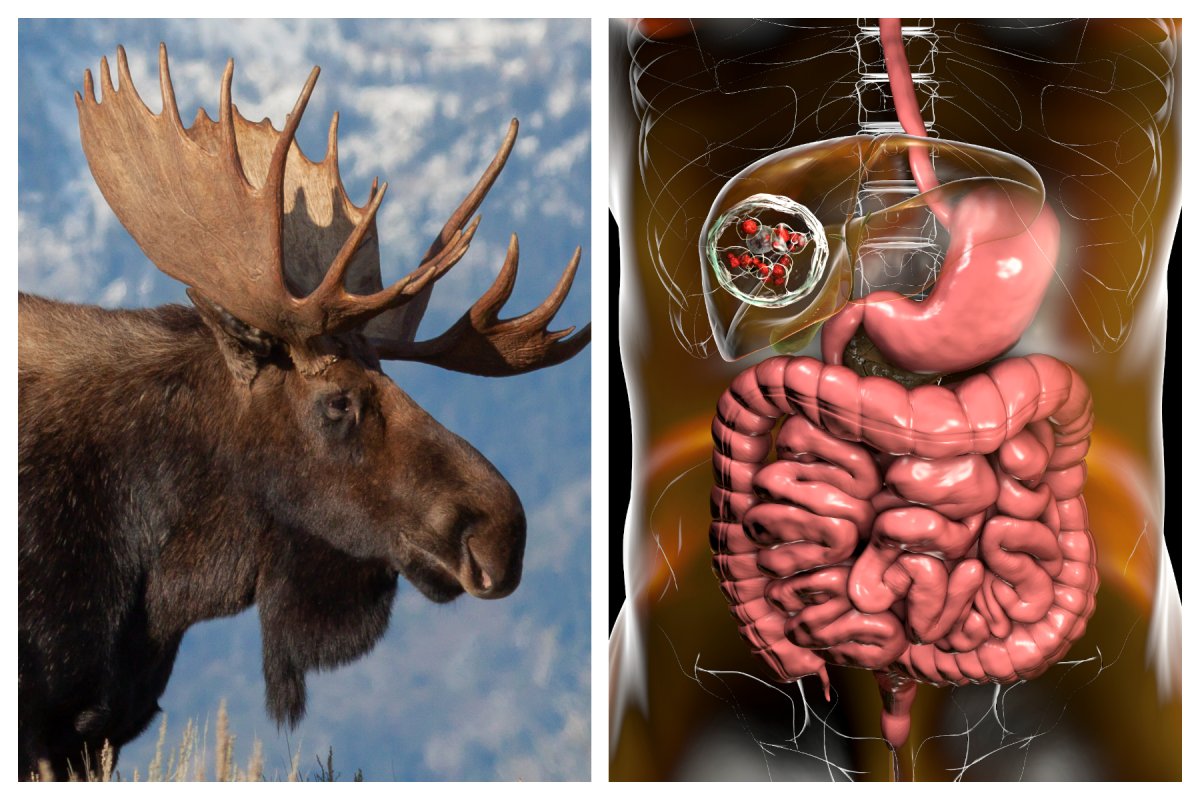A parasite never before seen in humans has been found burrowing in the internal organs of two moose hunters. The hunters, both from New Hampshire, were infected with the rare tapeworm after butchering a moose that they had hunted. Significantly, their pet dogs were present.
"It's the first time it's been identified in humans," Elizabeth Talbot, an infectious disease physician at Dartmouth Hitchcock Health and the state's deputy epidemiologist, told local TV station WMUR.
The tapeworm that the hunters had been infected with was identified as the species Echinococcus granulosus, also known as the hydatid worm, hyper tapeworm or dog tapeworm.

It spends its adult phase in the intestines of dogs and other canids—its definitive host—laying eggs that get excreted in the dog's feces. These feces are then consumed, usually by hoofed livestock animals, where the egg hatches into the larval cystic form.
This then gets embedded in the organs of the intermediate host after traveling around the body in the bloodstream. The larval cysts are consumed by dogs when they eat the offal or other meat of the animal, starting the whole cycle over again, according to the U.S. Centers for Disease Control and Prevention (CDC).
Cystic echinococcosis is caused by the larval stages of the tapeworm Echinococcus
— Journal of Helminthology (@JHelminthology) January 28, 2021
This study examines how geo-climatic factors affect the epidemiology of this parasite and how it can be used to inform control programmes for this tapeworm #WorldNTDDay https://t.co/wDyTm5ZbW8 pic.twitter.com/4qo8qV0bXQ
"Typically what happens is they are getting this because they may have had a dog that fed on the raw meat or raw organs of the animals, and then they pick it up through the feces of the dog," Dan Bergeron, the wildlife division chief at the state's Fish and Game Department, told WMUR.
In some cases, if a human is exposed to the feces of dogs, either by being licked by a dog or touching a dog that has licked itself, the eggs can make their way into the body. A human cannot be infected by consuming the moose meat directly. Exposure comes from interaction with dogs and the spread of the tapeworm eggs from the dog feces.
This can lead to the larval cysts forming in organs and causing hydatid disease, the CDC said, in which the cysts can press on the surrounding tissue as they grow larger over time. Depending on its location, abnormal organ function and neurological effects may result if a cyst is embedded in the brain or nervous system.
Talbot said an outbreak of these tapeworms in moose populations in northern New Hampshire has been tracked over the past few years.
New Hampshire's Health and Human Services Department has released multiple warnings to hunters in the region, as well as developing advice on how to avoid infection. Mitigation methods include not letting dogs consume raw meat, properly washing hands and making sure that dogs are on deworming medication. Dogs may also be given anthelminthic vaccinations, which are used to destroy parasitic worms.
Is there a health issue that's worrying you? Do you have a question about parasitic infections? Let us know via health@newsweek.com. We can ask experts for advice, and your story could be featured in Newsweek.
Uncommon Knowledge
Newsweek is committed to challenging conventional wisdom and finding connections in the search for common ground.
Newsweek is committed to challenging conventional wisdom and finding connections in the search for common ground.
About the writer
Jess Thomson is a Newsweek Science Reporter based in London UK. Her focus is reporting on science, technology and healthcare. ... Read more
To read how Newsweek uses AI as a newsroom tool, Click here.








